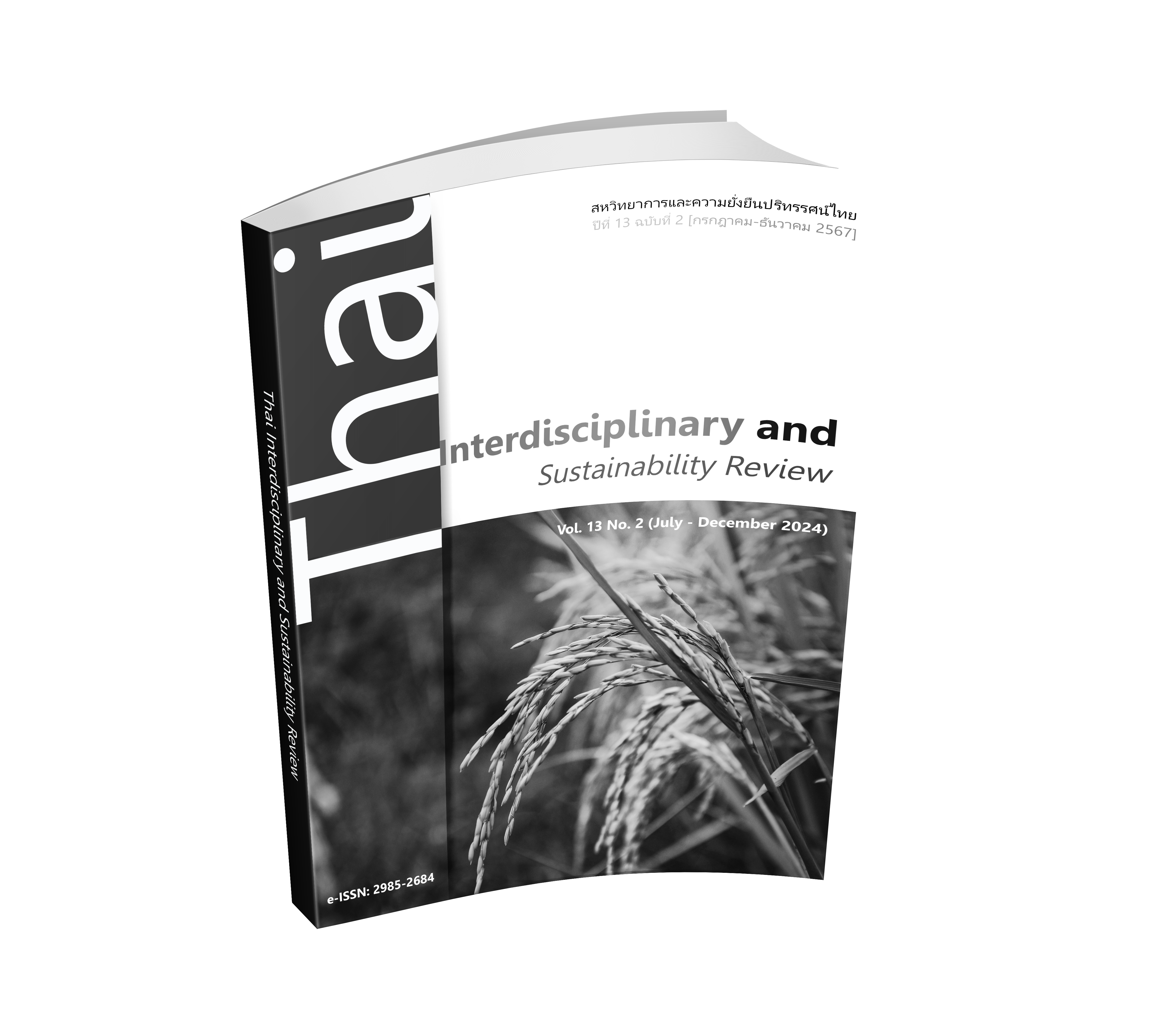THE PERCEIVED LOCUS OF CAUSALITY MEASUREMENT OF LOCAL ENVIRONMENT VOLUNTEER
DOI:
https://doi.org/10.14456/tisr.2024.25Keywords:
Construct Validity, Perceived Locus of Causality, Local Environment Volunteers, Self-Determination Theory, Intrinsic MotivationAbstract
This research is significant as it delves into Thailand's Perceived Locus of Causality (PLOC) Measurement construct validity of Local Environment Volunteers (LVE). By pinpointing the motivational drivers that prompt individuals to participate in environmental volunteerism. Employing the Self-Determination Theory (SDT) as the theoretical foundation, the investigation delves into five sub-constructs: amotivation, external regulation, introjected regulation, identified regulation, and intrinsic motivation. A survey gathers data from 214 LVEs in Nonthaburi Province. The Perceived Locus of Causality Questionnaire (PLOCQ) was adjusted as a measurement. The research results indicated that the PLOCQ measurement demonstrates construct validity with composite reliability and convergent validity, which is slightly lower than the passing criteria. However, considering the composite reliability values, factor loading value, and theoretical consistency, it can be concluded that the convergent validity is acceptable. The model does not fit with the data used for analysis. Additionally, external and introjected regulation motivations being more explanatory of the PLOC of LVEs than intrinsic motivation. This study enriches the existing literature by offering insights into the motivational aspects of environmental volunteers in Thailand.
Downloads
References
Abdallah, M. (2022). Effective Learning View: Intrinsic V Extrinsic Motivation. Journal of Educational and Psychological Research, 4(2), 369.
Ahmad, S., Zulkurnain, N., & Khairushalimi, F. (2016). Assessing the Validity and Reliability of a Measurement Model in Structural Equation Modeling (SEM). Journal of Advances in Mathematics and Computer Science, 15(3), 1-8.
Antoni, G. (2009). Motivations to volunteer and social capital: the role of intrinsic motivations in promoting networks of cooperative relation (Working Paper N.6). Milano: EconomEtica.
Bruyere, B., & Rappe, S. (2007). Identifying the Motivations of Environmental Volunteers. Journal of Environmental Planning and Management, 50(4), 503-516.
Bussell, H., & Forbes, D. (2002). Understanding the volunteer market: the what, where, who and why of volunteering. Journal of Philanthropy and Marketing, 7(3), 244-257.
Carlà, A., Flarer, H., Lehner, M., Mattes, A., & Reeger, U. (2023). Volunteering as a Means of Fostering Integration and Intercultural Relations, Evidence from Six European Contexts. Central and Eastern European Migration Review, 12(1), 49-63.
Cerasoli, C., Nicklin, J., & Ford, M. (2014). Intrinsic motivation and extrinsic incentives jointly predict performance: a 40-year meta-analysis. Psychological Bulletin, 140(4), 980-1008.
Deci, E., & Ryan, R. (2000). The "What" and "Why" of Goal Pursuits: Human Needs and the Self-Determination of Behavior. Psychological Inquiry, 11(4), 227-268.
Deci, E., & Ryan, R. (2008). Self-Determination Theory: A Macrotheory of Human Motivation, Development, and Health. Canadian Psychology, 49, 182-185.
Fornell, C., & Larcker, D. (1981). Evaluating structural equation models with unobservable variables and measurement error. Journal of Marketing Research, 18(1), 39-50.
Goudas, M., Biddle, S., & Fox, K. (1994). Perceived locus of causality, goal orientations, and perceived competence in school physical education classes. British Journal of Educational Psychology, 64(3), 453-463.
Hair, J., Babin, B., Anderson, R., & Black, W. (2019). Multivariate Data Analysis. 8th ed. New Jersey: Pearson Prentice.
International Labour Organization. (2011). Manual on the Measurement of Volunteer Work. Retrieved from https://webapps.ilo.org/wcmsp5/groups/public/---dgreports/---stat/documents/publication/wcms_162119.pdf.
Lonsdale, C., Sabiston, C., Taylor, I., & Ntoumanis, N. (2011). Measuring student motivation for physical education: Examining the psychometric properties of the Perceived Locus of Causality Questionnaire and the Situational Motivation Scale. Psychology of Sport and Exercise, 12(3), 284-292.
Moreno-Murcia, J., González-Cutre, D., & Chillón-Garzón, M. (2009). Preliminary validation in Spanish of a scale designed to measure motivation in physical education classes: The Perceived Locus of Causality (PLOC) Scale. The Spanish Journal of Psychology, 12(1), 327-337.
Nitiboramattada, J., Takaew, R., & Bunchua, K. (2021). Thai Decorum (Sombat Phudee): Principles of Good behavior or Means of Class Oppression. Proceeding National & International Conference, 14(1), 180.
Okafor, C., Njemanze, V., & Onyeneje, E. (2020). Roles of Perceived Locus of Causality, Social Distance and Gender on Willingness to Volunteer in Nigeria Local Community. AFRREV IJAH: An International Journal of Arts and Humanities, 9(1), 9-20.
Silvi, M., & Padilla, E. (2021). Pro-environmental behavior: Social norms, intrinsic motivation and external conditions. Environmental Policy and Governance, 31(6), 619-632.
Sloane, G., & Pröbstl-Haider, U. (2019). Motivation for environmental volunteering - A comparison between Austria and Great Britain. Journal of Outdoor Recreation and Tourism, 25, 158-168.
Teixeira, D., Monteiro, D., Carraça, E., & Palmeira, A. (2018). Translation and validation of the perceived locus of causality questionnaire (PLOCQ) in a sample of portuguese physical education students. Motriz: Revista de Educação Física, 24(2), e1018162.
Tentama, F., & Anindita, W. (2020). Employability Scale: Construct Validity and Reliability. International Journal of Scientific & Technology Research, 9(4), 3166-3170.
United Nations Volunteers. (2018). The Thread that Binds: Volunteerism and Community Resilience. Bangkok: United Nations Volunteers.

Downloads
Published
How to Cite
Issue
Section
License
Copyright (c) 2024 Authors

This work is licensed under a Creative Commons Attribution-NonCommercial-NoDerivatives 4.0 International License.









.png)


